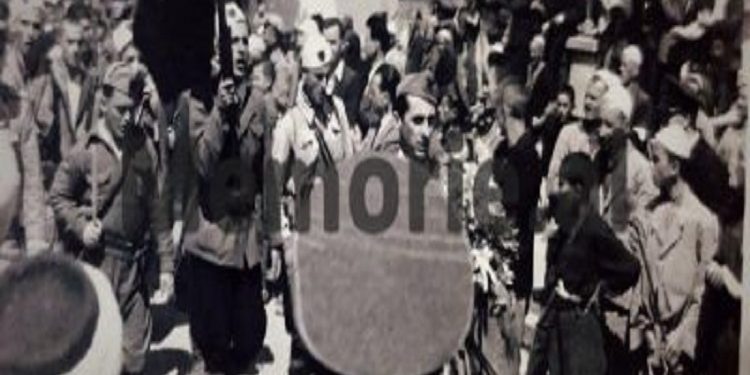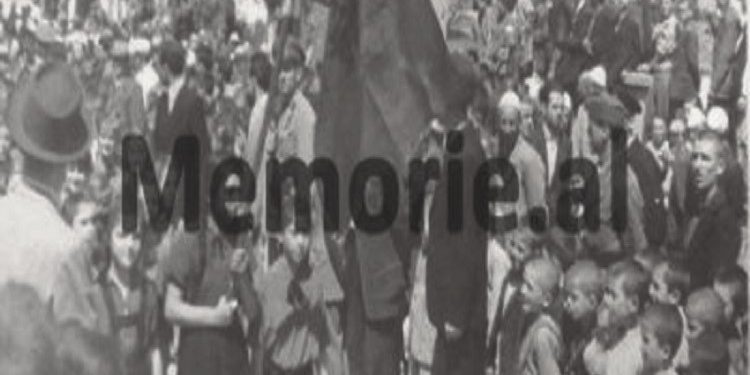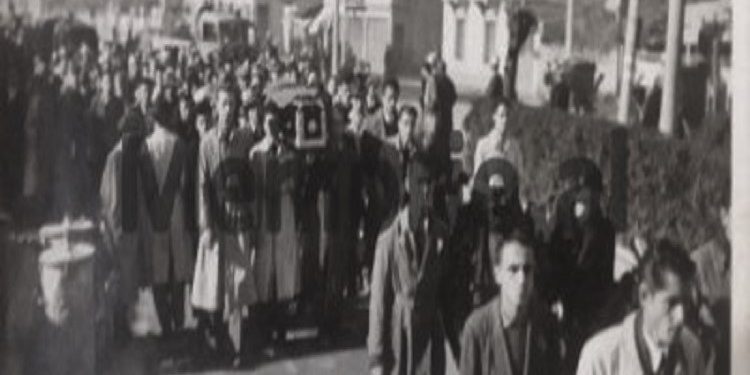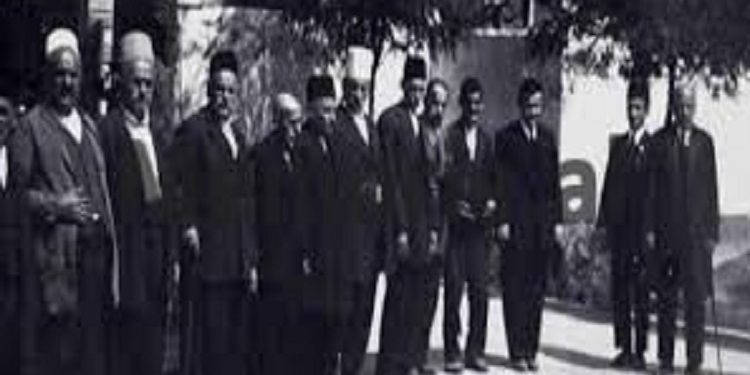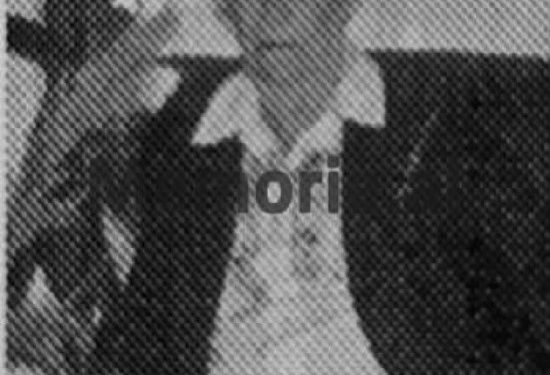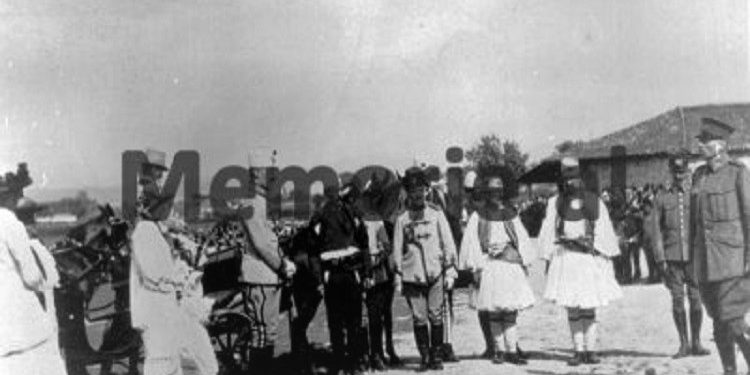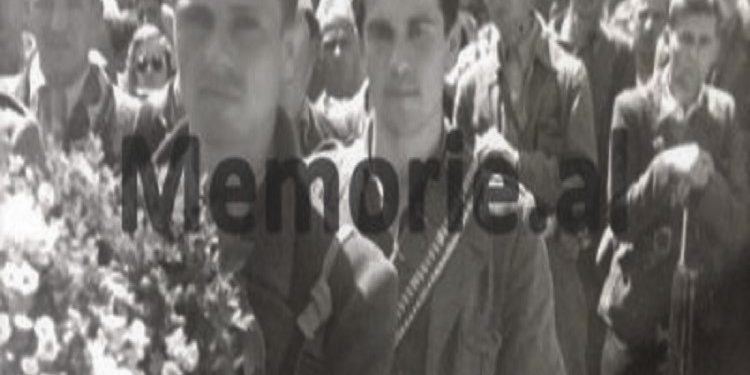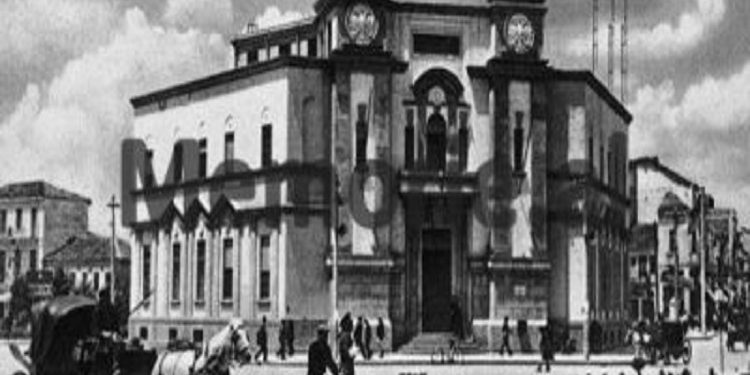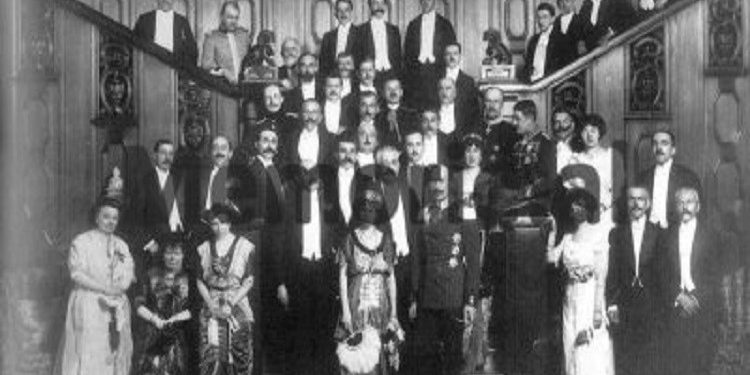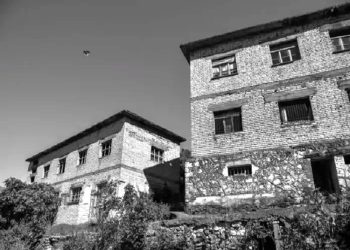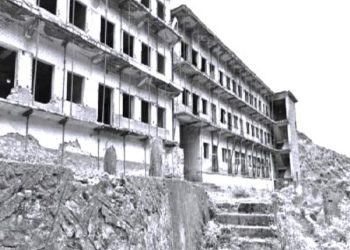Dashnor Kaloçi
Memorie.al publishes the unknown story of the famous Tirana family Zhelegu, who took the surname Banka, after its first, Haxhi Isuf Banka, graduated from the Faculty of Economics in Istanbul in 1887, returned home and served in Albanian finance under the Ottoman administration and later as Minister of Finance in the government of Prince Wied and member of the first Albanian parliament, where he joined the Society “Union” led by Avni Rustemi and took an active part in the June Revolution of 1924. His departure from politics after Zog came to power in 1925, which made him several offers to include him in his top administration, as well as the tragic fate of the family of his son, Mustafa, after the arrival of to the ruling communists, after his three sons became active with the nationalist organization Balli Kombëtar during the War, where Imran was killed in Preza, Rizvani fled with Mi’hat Frashëri and Vildani suffered in Enver Hoxha prisons
“Our family was targeted by the communists after the murder of our brother, Imran, on September 14, 1944, when he was fighting against them in Preza Castle. Based on this, on the first day of the liberation of Tirana, some partisans came to our house on “Royal” Street and searched for the other brother, Rizvan. They searched and raided the entire house, wanting to arrest Rizvan, who had taken up arms in the Nationalist National Front National Squads. “As they could not find Rizvani, who had fled Albania in mid-November 1944, together with Mit’hat Frashëri and the main exponents of the National Front of Legality, they took their other brother, Vildan, with them.” This is how Vera Banka (Zëmbaku) remembered the murder of her brother who was with the Balli Kombëtar Youth Squads, which caused the whole family with the surname Banka to be persecuted by the communist regime of Enver Hoxha, as well as the two brothers. others of her, had participated in the nationalist organization Balli Kombëtar. What is the history of the old Tirana family Banka and who was their first Isuf Haxhi Banka? Who was Mustafa Banka, why did his three sons join the nationalist organization of the National Front and how were they persecuted by the communist regime of Enver Hoxha after the assassination of Imran and the escape of Rizvan?
Who was Isuf Banka?
The Banka family, or as it is otherwise known by its first surname Zhelegu, is of old Tirana origin. One of the most famous men of this family who has made a great name, was Isuf Banka, or as he is otherwise known as Hajji Isuf Banka, because of his pilgrimage to Mecca. Isuf Zhelegu was born in 1864 in the city of Tirana and their house is still located somewhere near the center of the capital, in the neighborhood that was once called “Abdulla Beg”, at “Mbretnore” Street, or “Barricades”. After finishing the Primary School in Tirana, Isuf Banka went to Turkey, where he graduated in Finance at the Faculty of Economics in Istanbul. After graduating in 1887, Isufi did not accept the offer to serve in the senior administration of the Ottoman Empire in Turkey, but returned to Tirana with his family. From 1887 when Isufi returned to Albania, until 1908, there are no accurate data on his life, but it is said that he worked as a financier at the Banking Office of Tirana, being one of its main leaders. . From that period, due to the work he performed as a financier at that banking institution, Isuf Zhelegu was no longer acquainted with his first surname Zhelegu, but he was called: Isuf Banka.
Isuf’s political activity
Isuf Bank’s political activity began there in 1908, when some well-known Albanian intellectuals and patriots began to organize in the framework of the movement for the secession of Albania from the Ottoman Empire. During that period, Isuf Banka joined Abdi and Refik Toptani, Shefik Kondi and Ibrahim Hafiz Dalliu, who formed a secret organization otherwise known as the “Union” Club, where Isufi was appointed secretary. After the “Union” Club caught the eye of the people of the High Gate, the Ottoman authorities ordered Shefqet Turgut Pasha to send people to arrest Isuf Bank, but he managed to escape arrest by hiding from some of his friends in Tirana and continued his political activity aimed at organizing a movement which would lead to the independence of Albania. As a result, on November 26, 1912, together with Sheh Ali Pazar, Fan Koja and Captain Seit Borshi, Isuf Banka participated in the raising of the Flag in Tirana. Subsequently, in the government of Prince Wid, Isufi was appointed Minister of Finance, which he held until his arrest by Haxhi Qamil’s rebels in the spring of 1915. Isufi was released from prison in June 1915 and was immediately summoned by Esat Pasha Toptani, who appointed him to his government, also with the post of head of Finance. After the fall of that government in 1916, Isuf Banka left with Esat Pasha for Thessaloniki, where he again exercised his duty to the government in exile headed by the same Toptan. After staying abroad for some time, Isufi returned to Albania in 1918 and from that time until the Lushnja Congress, he served in the local administration of the Durrës government, acting as the deputy prefect of Kavaja.
Member of Durrës in the first Parliament in 1921
In the first parliamentary elections of 1921, Isuf Banka was elected deputy of Durrës (for the Region of Tirana) being elected a member of the National Assembly. Also, in 1921, Isufi was appointed plenipotentiary for the suppression of the Mirdita Uprising led by Gjon Marka Gjoni, where the commander of the Operation was the Minister of Interior, Ahmet Zogu. Isuf Banka won the parliamentary mandate again in the elections held in 1923 and at that time he sided with the opposition group led by Fan Noli. Together with his son Mustafa, Isufi was one of the most active members of the “Union” Society led by Avni Rustemi and after his assassination, he also participated in the June Uprising. Based on this, in December 1924, when Ahmet Zogu returned to power, Isufi went to Vlora and asked for help from some of his friends to leave Albania. The beys of Vlora asked Isufi to return to Tirana, after they talked to Ahmet Zogu and guaranteed that he would not be touched. After that Isufi returned to Tirana and Zogu not only did not harass him, but made several offers for him to work in the senior administration of his government. Isufi declined that offer and locked himself in the house eventually giving up politics. He died in 1944 (at the age of 80), in Tirana and was buried with great honors by the Municipality of the capital which organized the entire funeral ceremony in the mosque of Sulejman Pasha, where under the sounds of the spiritual band, his coffin was covered with the national flag and the keynote speech was held by Ramazan Jarani.
Brothers Bank, with the National Ball
Haxhi Isufi, in addition to three daughters: Fatima, Havasa and Mereme, left a son named Mustafa, who was born in 1900. After graduating from the Plotore school in Tirana, like his father, Isufi, who graduated in Finance at the Faculty of Economics of Istanbul University, Mustafai also started working as a financier in the state administration of that time. Mustafa married in 1921 a girl named Fitnete Tartari, and from that marriage they had four sons and two daughters: Rizvani, Vildani, Qefserja, Imrani, Vera and Ihsani. Although the Bank family was known as Zog’s opponents, as Isufi and Mustafai had taken part in the June 1924 Uprising, they not only were not fought by Zog during the years of the Monarchy, but on the contrary, Mustafai worked as a financier in his administration. , until April 1939, when the fascist aggression against Albania took place. After 1939, Mustafa Banka was appointed financier in the General Claim of the Albanian National Army, although he never agreed to wear the black shirt and join the Fascist Party. The Banka family at that time was known throughout Tirana as a nationalist family and three of Mustafa’s sons (Rizvani, Imrani and Vildani) joined the nationalist forces of the Balli Kombëtar organization. In this regard, Mustafa’s daughter Vera Banka (Zëmbaku) testified: “Our grandfather Isufi, and of course Father Mustafa, had a great influence on the formation of my brothers with nationalist convictions. Likewise, in addition to what they received from the family, they were also influenced by the close friendship and friendship they had with the well-known Tirana nationalists, such as; Osman Kazazi, Seit Demneri and Halil Balla. In addition to Ihsan, who was young at the time, the other three brothers cooperated closely with the nationalist districts of that time, where their principal leaders occasionally came to our house. Imran, was more active than the other brothers and he, after distributing the tracts of Balli Kombëtar, sat down at dinner and recited patriotic poems to his mother, saying: ‘Whoever dies for his homeland, has not died but has left’. Likewise, Rizvani, in addition to his political activity in the ranks of the nationalist organization that took place in Tirana, participated with weapons in hand with the Youth Front of the National Front “Besnik Çano”, which in June 1944 went to fight in Kosovo. I remember as now that day when the volunteers of that gang, most of whom were very young boys, gathered and lined up in front of the Balli Command which was on Saraçve Street. After that they went out on the street where they were waiting for the trucks and Rizvan was second in the column after the platoon commander, Seit Demner. Rizvani carried the national flag accompanied by his two close friends Arif Peza and Xhemal Alimehmeti “, Vera Banka remembers regarding her brothers who actively participated in the organization of Balli Kombëtar.
The killing of Imran and the escape of Rizvan
Around 1944, when thousands of partisan detachments and brigades were filled with volunteers, in response to it, the nationalist organization Balli Kombëtar increased the number of detachments it had at the time, with young nationalists who volunteered in the mountains. One of them was 15-year-old Imran Banka, who in September 1944, went to Preza and joined the nationalist gang commanded by the famous Xhemal Gjergji, who had long been the terror of the communists. Regarding this, his sister Vera told us: “Shortly after Imran had joined the gang operating in that area, on September 14, 1944, he fell and was killed in Preza Castle. Imran’s assassination came after the command of his gang fell into the trap set by a partisan gang operating in that province, which after inviting them to talks and joint actions, surrounded them and struck them in surprise. Imran was killed by jumping from a high wall and with him in those moments was his friend from Shkodra, Rudi Kiçi. “Imran’s murder shocked our family immensely, because he was very young and had not yet turned fifteen”, Vera Banka recalled the murder of her brother Imran, who is known as the youngest martyr of the nationalist organization of National Front. After his assassination, seeing the communist danger threatening Albania, Vera’s other brother, Rizvani, who had fought and been wounded in Kosovo against Chetnik forces, left Albania in November 1944 together with the main leaders of the National Front and Legality. After staying for some time in Italian camps, Rizvani emigrated to Canada.
Vildan was imprisoned in 1951
Seeing the attitude of the Bank family, which was closely associated with the National Ball, the communists began to take revenge on it in November 1944, when the war was not over. In this regard, Vera Banka testified: “In fact, our family was targeted by the communists after the murder of our brother, Imran, on September 14, 1944. Based on this, from the first day of the liberation of Tirana, in the house Some of our partisans came to “Royal” Street and looked for the other brother, Rizvan. They searched and raided the whole house, wanting to arrest Rizvan, who had taken part in the Balli Kombëtar squads with a gun in his hand. Unable to find Rizvan, who had fled Albania in mid-November 1944, together with Mit’hat Frashëri and the main exponents of the National Front of Legality, they took their other brother, Vildan, with them. After holding him in custody for several days, they released him after the head of our neighborhood told them that he was not Rizvani, but Vildani. Even after Rizvan’s release, partisan forces came almost every night and surrounded the house, remembering that they would find Rizvan there. In 1945 Vildani was employed in the orchestra of Radio Tirana where he played the violin and at that time he was able to finish high school in Tirana. After that he was appointed a teacher in the military school “Skënderbej”, from where he was removed in 1948 due to the biography of our family. After leaving the military school, he was taken to Berat where he was arrested in February 1951, accusing him of “involvement in the bombing of the Soviet embassy in Tirana.” After Vildan was imprisoned, we were removed from the house and the Security monitored us regularly. Vildani spent three years in prison and when he was released he worked as a laborer and then was able to arrange himself as an orchestra in several bars in Tirana and Durres. In 1961, when the class war eased a bit, he was able to finish the night without a break from work at the University of Tirana for Mathematics and at that time he was allowed to visit Albania by Rizvan’s wife who lived in Canada, where Rizvan was known as ” Tekke e Shqiptarëve”, because he was the man who sheltered every Albanian who went there. “Even the younger brother, Ihsani, worked all his life as a manual laborer and whenever there were parades for the May Day holiday, he was not allowed to parade with the companies in front of the tribune”, Vera Banka (Zëmbaku) recalled about her family’s persecution. which in the years of the War was closely connected with the National Ball? Now only Vera lives from the Mustafa Bank family who died in 1971, as Vildani, Rizvani and Ihsani, who suffered communist persecution, separated from this life in 1994, 1997 and 1998, as they had been able to live only a short time in that regime they had dreamed of for half a century ago./Memorie.al






